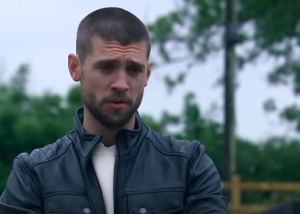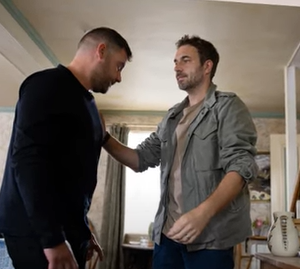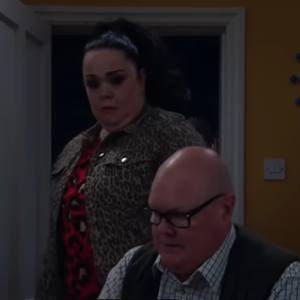In the quiet rural expanses of Emmerdale, a storm brews beneath the serene surface of farm life—where terrors lurk not just in nature’s wilds but in the desperate machinations of a determined adversary. The household of the Butlers, once a haven, has become a battleground for survival and fiercely protectionist instincts. The story unfolds with Kyle, a man driven by primal urgency and love, confronted with the chilling reality of an intruder trespassing on his family’s land. This isn’t a simple trespass; it’s a calculated menace tied to a ruthless plan to wrest away the family’s cherished farm at any cost. The tension ratchets up as Kyle, armed with nothing but a pitchfork—the very symbol of his agrarian life and heritage—faces down a threat that violates the sanctity of his home. The intruder comes cloaked in false civility, claiming casual rights to walk on the land, while beneath this veneer, lies a sinister ambition to seize the farm forcefully. Kyle’s warning is clear and raw: this land is fiercely defended, and the price of trespass is paid in vigilance and courage. This moment captures a deep-rooted drama about family legacy, pride, and the lengths to which one will go to protect all one holds dear.
The sinister undercurrent flows through the conversations that darken the everyday. Dawn and Kim’s discussions reveal the creeping shadow of a corporate interest making offers and ultimatums, refusing to accept ‘no’ for an answer. Money is no longer the sole motivator—there is a vendetta here, fueled by a cold determination to own the land regardless of the consequences. The Butlers are caught in a war of wills where negotiations have surrendered to intimidation, and friendly overtures have transformed into threats with violent undertones. As the family braces for the impending storm, the very safety of their children comes under siege. Kyle’s fear morphs into fierce protection when his child is taken hostage and threatened with a weapon—the chilling pitchfork becoming an emblem of both defense and danger. Every heartbeat echoes with the weight of the threat; the farm, their home, and their lives hang in a precarious balance between survival and loss. This escalation from mere property dispute to violent intrusion reflects a desperate struggle, where personal vendettas intertwine with the cold business of winning at any cost.
The chilling nights give way to tense confrontations as Kyle stands his ground, emotions boiling under his determined exterior. The family’s raw emotions—from fear to defiance—are palpable as the community’s thin veil of peace is torn away. The arrival of police officers brings a brief respite but also highlights the limits of law and order in the face of such personal and violent conflicts. Dialogue filled with suspicion, accusations, and thinly veiled threats punctuates every exchange, exposing the fractures in trust and the dangerous gamesmanship surrounding the farm’s ownership. Questions of morality and legality come to the forefront as the police subtly suggest that violence cannot be condoned, yet their presence cannot instantly erase the scars left by the night’s terrors. This chapter of the story reveals a society pushed to its limits, where justice and survival clash and where the law can sometimes feel just a fragile shield against the raw, unyielding forces of human desperation.
As the community watches and whispers spread, the emotional toll weighs heavily on the family. Kyle’s resolve hardens but the fear is not easily shaken—the perception that the threat could return at any moment places everyone on edge. The children’s innocent questions about losing their home cut through the tension like a knife, exposing the vulnerable heart of this family drama. The parents’ reassurances mask their own anxiety and exhaustion as they grapple with an uncertain future. These intimate moments of fear and hope are juxtaposed against the looming shadow of the intruders and the relentless pressure from the wealthy entity that refuses to relent. The narrative forces readers to confront the fragility of security and the fierce, sometimes brutal fights waged to preserve what is most precious. Kyle’s pitchfork is symbolic—a tool of work transformed into an instrument of defiance—underscoring the raw reality that in defending the land, the family is defending their very identity and legacy.
The climax barrels toward a gripping showdown filled with tension and raw emotion. Kyle’s vow to protect his family escalates into a physical confrontation that is as much about primal survival as it is about justice. The intruder, initially a shadowy menace, becomes fully exposed in a violent, edge-of-your-seat encounter that pushes the characters to their limits. The community’s shock and disbelief at the unfolding events echo the deep-seated fears that violence will erupt when desperation and entitlement collide. The final scenes reflect the high stakes, where threats cross invisible lines and where the violence is as much about making a statement as it is about physical harm. Police intervention underscores the gravity of the conflict but also the complexity of protecting a family from a determined and relentless foe. In the end, this story is a powerful drama about courage, family bonds, and the fierce human spirit that refuses to bow to intimidation. It leaves readers breathless and reflective on what lengths one will go for the sake of home and honor, weaving a tale of suspense and heartache that lingers long after the final moment.





